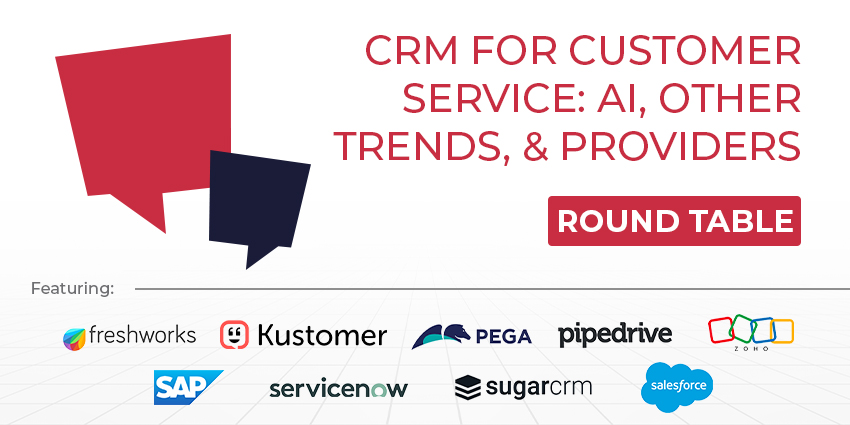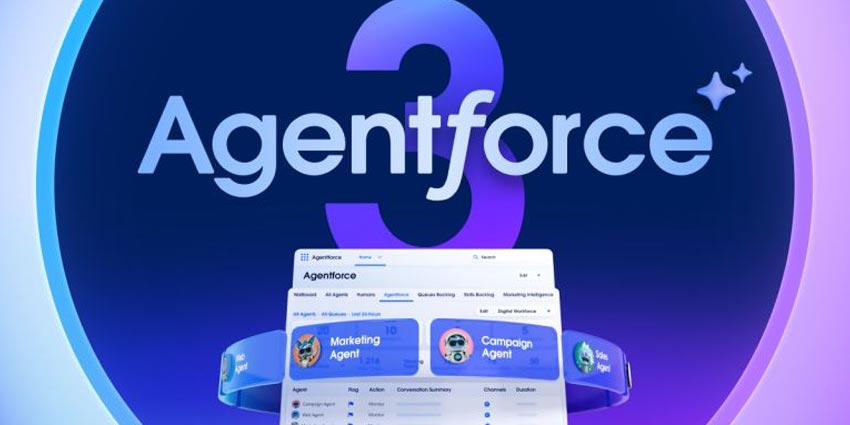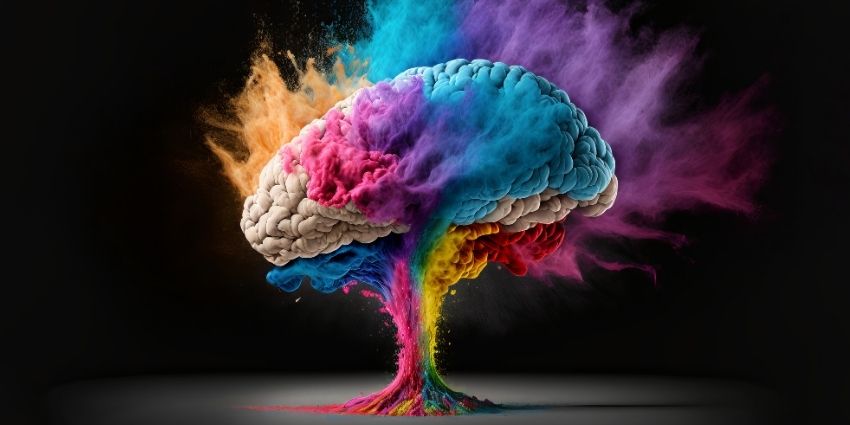As CRM systems swallow up more of the service stack, they are becoming increasingly central to day-to-day contact center operations.
The latest AI innovations are helping to drive that trend forward, especially around conversational intelligence, which helps secure new intent, sentiment, and behavioral data.
However – alongside AI – there are several other critical trends. From native voice to low-code orchestration, CRM for customer service is a blossoming field.
Thankfully, our nine industry experts for this month’s roundtable have their fingers on the pulse. Each comes from a prominent CRM provider within the space. They are:
- Steve Rycroft, VP & GM UK at Freshworks
- Brad Birnbaum, CEO and Co-founder of Kustomer
- James Dodkins, Customer Experience Evangelist at Pegasystems
- Mara Vicente, VP of Customer Support at Pipedrive
- Paul O’Sullivan, SVP at Salesforce
- Shardul Vikram, CTO at SAP I&CX
- Simon Morris, VP of Solution Consulting at ServiceNow
- Stuart Hall, SVP of Customer Success at SugarCRM
- Suvish Viswanathan, Head of Marketing UK & Europe at Zoho
Below, these specialists share the most pervasive trends from the CRM for customer service space before highlighting what differentiates the providers they work for.
CRM for Customer Service: AI Trends
AI Pulls CRM and ERP Systems Together
Vikram: AI is transforming how service teams interact with their customers by providing powerful, data-driven recommendations, insights, and a more holistic view of customer relationships.
Yet, businesses should consider a CRM platform that connects customer conversations to relevant enterprise data. Typically, that data lives within an ERP system.
Combining enterprise-wide data with generative AI delivers insights to customer service representatives’ fingertips, including a holistic view of the customer and how best to resolve a customer’s concern.
Some of the key AI-driven capabilities for service teams are automated case and interaction summaries, generative answering, ticket categorization, and next-best actions.
Thanks to the integration of these AI capabilities with business data, the service agent sees the complete 360 profile of the customer.
Consider a customer call for a problematic refrigerator. With that 360 profile of the customer, the agent doesn’t need to verify the product’s warranty status. AI has analyzed the customer’s purchase history and product details to inform them if it is under warranty. As such, the agent can swiftly start the replacement process, if needed.
AI Generates More Customer Context
Morris: The modern consumer shows a clear preference for hyper-personalized experiences, now more than ever before. This is where AI comes into the equation.
By analyzing vast amounts of customer data, such as browsing behavior and purchasing history, CRM providers build a clearer understanding of their customers’ history through buying patterns.
Understanding the customer is the first step of the journey. CRM providers can leverage AI-driven recommendation engines to suggest products or services tailored to unique customer preferences.
As a result, they may provide customers with the hyper-personalized experiences they seek, ultimately improving overall customer satisfaction.
Native Copilots Become All the Rage
Rycroft: An AI copilot can significantly enhance productivity for customer service teams. These assistants, always available, summarize conversations, suggest wording tweaks, improve tone, and prompt next steps, leading to better experiences for both employees and customers.
Moreover, copilots offer real-time guidance that increases efficiency and saves time. With embedded machine learning, they also continuously improve, helping service desk operators handle complex interactions by understanding context and providing relevant responses.
Additionally, these assistants streamline processes through automated ticket routing, ensuring tickets are assigned to the right agents based on skill, workload, and predefined rules.
Lastly, they utilize predictive analytics and personalization capabilities to analyze past trends, optimizing service for each customer.
AI Auto-Summarizes Customer Cases
Hall: Case summarization is an excellent example of how AI is helping Customer Service teams deliver better outcomes for customers.
Summarizing large amounts of information such as emails, case notes, and other data enables service agents to get up to speed very quickly on unfamiliar cases, preventing the customer from having to repeatedly give the same information and moving cases forward faster.
AI-based summarization can also provide a more consistent structure which can be used to build better knowledge bases.
Lastly, summarized cases can be used to improve the training and onboarding of new agents, enabling them to get up to speed faster.
Conversational AI Comes to the Fore
Birnbaum: AI chatbots are replacing the need for customer service agents to answer every customer query by automating responses using generative AI. This helps service teams scale without additional headcount and also allows agents to focus on handling more complex issues.
At Kustomer, we’ve already seen our AI chatbots cut service queries by 45 percent.
By integrating AI chatbots with CRM data, the responses are much more relevant to the customer and the situation’s context.
Also, if the bot transfers the customer to a live agent, then AI can quickly summarize the conversation for the human agent to get up to speed quickly, and not require the customer to have to repeat him/herself.
Meanwhile, AI boosts productivity by 65 percent for agents by using CRM data to suggest contextually relevant responses to customers in their local language.
O’Sullivan: The 2024 Salesforce State of Service Report found that 93 percent of service professionals at organizations investing in AI say the technology saves them time on the job.
Chatbots that automate routine tasks and provide AI-generated answers to common customer queries are a significant part of this. They free up customer service agents’ time to focus on more complex issues that require a human touch.
In addition to facilitating simple, consistent, and smooth implementations, advanced chatbots support a variety of languages and communication channels, enabling customer support personnel to provide quicker and more individualized services.
Viswanathan: Customer service chatbots can use AI to aid customer service. Rather than needing staff to manage every inquiry, AI-enabled chatbots can handle initial requests to streamline the process and create a more effective system for customers and staff.
In businesses with high customer inquiry volumes, AI-powered chatbots can significantly reduce the time of response, boosting customer satisfaction.
Typically, these chatbots are trained with a pre-defined script and set of rules and handle the first line of customer interaction. However, with advancements in technology, the whole approach can be made more intelligent, personalized, and engaging.
This speeds up customer response time and frees up customer service teams, who can be deployed to higher-complexity cases referred by the chatbot if it doesn’t have the necessary information.
Finally, GenAI-enabled chatbots can summarize and review conversations while serving up customer sentiment insights.
Hyper-Personalization Becomes Paramount
Dodkins: AI is aiding customer service teams by creating personalized experiences. Consider AI tools that analyze the heaps of customer data that businesses collect to provide tailored product and service recommendations and the next best steps at the right time.
Personalizing each interaction makes customers feel as if they are individuals, which leads to much higher satisfaction and loyalty.
In addition, predictive analytics, powered by machine learning and process AI capabilities, can be used to create proactive customer service practices. These AI tools can predict customer needs and behaviors by analyzing past interactions and resolving issues even before they arise.
Providing this level of tailored interaction requires enhanced data management, so implementing AI right into the heart of CRM capabilities ensures that customer service agents don’t need to manually sort and analyze data. Instead, they can spend their time doing higher-value tasks.
AI Offloads the Simple Tasks
Vicente: By handling the simplest tasks, AI for customer-facing teams enables them to be faster and better equipped to deal with the complexities of their work.
Indeed, teams using AI are able to leverage technology to enhance customer relationships and make human interactions as meaningful as possible.
According to Pipedrive’s recent 2024 State of Sales and Marketing Survey, an overwhelming 83 percent of respondents from businesses of all sizes believe AI will play a crucial role in business, with 35 percent already incorporating it into their daily tasks.
To put these use cases into perspective, Pipedrive has released an AI suite as part of its CRM designed specifically to help customers operate more efficiently.
The “Write My Email Using AI” feature enables users to draft emails with customized prompts and other user-defined criteria with the click of a button. As such, agents can write “enticing” emails in only 44 seconds.
CRM for Customer Service: Other Trends
Democratized CRM Systems Grow in Prominence
Viswanathan: Many businesses fail to unify various customer touchpoints within a centralized system. This can result in disjointed customer engagement, leading to an inconsistent and sometimes negative experience.
Democratized CRM systems are one solution, offering all customer-facing staff relevant access to provide a consistent, unified experience.
Importantly, this can allow sales teams, who predominantly oversee customer relationships, to communicate and coordinate a customer’s deliverables, such as onboarding, contract management, and solutions engineering, all from one place and enable anyone else dealing with a customer to see the entire customer journey.
This democratized approach improves visibility for every stakeholder in the customer journey, mitigates gaps in coordination, reduces turnaround time, and improves the experience.
Workflow Integration and Automation Remain Critical
Vicente: Beyond AI trends, streamlining CRM workflows remains crucial for maximizing efficiency and effectiveness. Automation in CRM is top of mind for sales professionals.
According to Pipedrive’s recent State of Sales and Marketing Report, 81 percent of respondents indicated that they use automation tools directly integrated within their CRM.
To stay competitive as a CRM provider, easy integration of automation into CRM software is key.
When all integrations can interact with each other, customers can sync their business data in one place. This enables different teams to have a comprehensive view of all data across platforms, facilitating the effective management of customer relationships and empowering CRM professionals to make the best business decisions.
CRM Unites Service, Sales, and Marketing Data
Vikram: Beyond AI, organizations are searching for CRM platforms that offer a holistic view of customer experiences.
To do so, they must integrate data from sales, marketing, and operations to reduce silos, increase collaboration, and inform customer interactions.
This can improve productivity for customer service teams by streamlining repetitive tasks and increasing resources spent on high-quality service.
An integrated CRM platform can also adapt to the ever-changing needs of customers and instantly provide updates to all teams.
From there, customer service professionals can provide responsive and comprehensive assistance as they can anticipate and prepare for opportunities and potential challenges across the business.
Managing Different Types of Data Becomes Table Stakes
Birnbaum: Newer business models such as on-demand delivery services and marketplaces seek one system to manage relationships across multiple parties – not just customers, but also partners and other business sellers.
In these models, multiple stakeholders interact with the customer across different branded channels.
These businesses need a CRM that is flexible enough to ingest, organize, and manage all these different data types while giving the right visibility to the data to protect customer privacy. This is massively complex.
Omnichannel Holds Firm as a Critical Focus
Dodkins: One non-AI-related trend impacting CRM for customer service is omnichannel operations, which create seamless integration across all channels.
These interactions are personalized, consistent, and continuous regardless of which touchpoints the customer chooses, such as in-person, online, mobile app, email, or phone.
As such, customers can choose the channel that works best for them, which increases satisfaction.
With omnichannel CRM systems, all customer interactions are tracked, so organizations can better map their entire customer journey.
This is especially beneficial when businesses are looking to identify pain points and ways to improve their service quality and build stronger customer relationships.
Not only that, as all customer interactions are stored in one place it allows customer service agents to quickly access information, which increases efficiency when helping customers.
“Whitespace Analysis” Becomes a Critical Initiative
Hall: The deeper CRM and ERP data integration that allows companies to do “whitespace analysis” and more effectively discover hidden upsell, cross-sell, link-sell, and switch-sell products and services.
Together, the solutions bring the front-office (CRM) and back-office (ERP) together for greater data visibility and to proactively interpret the information into actions for more impactful sales strategies to drive revenue, profitability, and customer retention.
Service Teams Connect Experiences by Overcoming Data Silos
O’Sullivan: Traditionally, customer service teams have struggled with data silos.
According to Salesforce research, 81 percent of IT leaders report data silos are hindering digital transformation efforts – causing fragmented experiences where customers are repeatedly asked for the same information by different departments.
Today’s customers have come to expect exceptional experiences supported by well-connected data through integrated systems.
An integrated platform consolidates various data sources into a single source of truth and personalized, intelligent customer service is made possible by this integration for every touch point of customer contact.
Channel Integrations Become Tighter
Rycroft: In the digital-first era, customers dictate the rules. They choose their preferred communication channels while expecting round-the-clock accessibility and demanding fast, empathetic, and personalized interactions.
The best tools must, therefore, provide ‘out-of-the-box’ integrations with the channels that customers want to use – whether that is WhatsApp, Instagram, Facebook, or TikTok. Allowing the user to engage on their own terms is essential to providing the best service for customers.
Furthermore, omnichannel solutions can aggregate queries and replies from across channels into a single view, giving agents the context they need to deliver personalized service quickly as soon as they receive the ticket.
Morris: Consumers engage with brands in many ways, including by phone, social media, online, in person, or via social media. Customers, therefore, expect consistent and unified experiences across these channels.
Upholding a consistent experience requires customer service staff to have all the necessary information to provide a cohesive level of support without missing historical interactions that might shape how they serve their customers.
CRM providers must ensure all relevant channels are successfully integrated. For example, all emails and calls from an individual customer should be tracked in one place associated with the relevant customer profile, ultimately shaping a 360-degree picture of the customer.
CRM for Customer Service: The Providers
Freshworks
Rycroft: Freshsales Suite empowers support teams to get a true 360-degree view of their customers, capturing interactions in one place and utilizing powerful AI to identify leads.
Powered by Freshworks’ built-in AI engine, Freddy AI, teams can eliminate manual effort and save time by automating repetitive, mundane tasks – improving productivity and raising team morale.
Freshsales is a CRM solution with a single source of truth for each customer’s journey. It is also extremely adaptive, letting teams redesign the CRM to match their own needs. They can do so through customizable Contact Lifecycle Stages, Fields, Modules, Sales Activities, and multi-currency and language optimization.

It also supports customer engagement over email, phone, chat, SMS, and WhatsApp, allowing teams to interact with their customers wherever they are.
With Freshworks’ Freddy AI integrated into the CRM, custom bots can be set up on your website and automate chat messages to collect visitor information across sessions, provide relevant information, and offer valuable content for customers.
Kustomer
Birnbaum: By capturing crucial data upfront, Kustomer aims to fundamentally change the customer experience, enabling anticipatory service that addresses needs before they become problems.
Its CRM fuses AI, data, and applications to empower companies to capture key data at mission-critical customer touchpoints.

Moreover, Kustomer understands that the magic lies not only in the ‘what’ of the data but crucially in the ‘when.’ After all, data is the lifeblood of modern customer service, powering support platforms with timely insights for an unparalleled understanding of your customers.
But Kustomer doesn’t stop there. It augments AI to transform raw data into actionable intelligence.
In doing so, Kustomer is helping its customers not only react to their needs but proactively anticipate them. This approach elevates customer service; it redefines it.
Pegasystems
Dodkins: Pega offers a unified CRM platform that enables businesses to connect across systems and organizational siloes, creating a cohesive backend system. This is driven by real-time AI capabilities, integrating low-code operations and omnichannel solutions.
By applying AI in real-time, businesses can deliver personalized experiences by analyzing data and customer interactions as and when customer service agents can recommend the next best actions at the right time and in the right context.

Low-code tools mean there are fewer barriers to customer service experts’ involvement in improving the systems’ processes to support them and deliver the best outcomes for customers.
Importantly, Pega’s systems are scalable and provide a ‘center-out’ business architecture. This works backward from defining the recommended outcome for a customer first and then working to meet those needs with case management CRM software.
Pipedrive
Vincente: All customer-facing professionals want the same thing out of a platform: one that understands their workload and the next best actions.
Tools like these allow them to execute all tasks as efficiently as possible, with enough supporting information to ensure they hit their goals and help customers succeed.
Pipedrive provides industry professionals with a built-in trusted sales consultant by their side at all times, making it easy for them to get organized, track all of their existing customers and leads, and understand their sales pipeline flow from top to bottom.

The provider also integrates AI directly into its tools to automate each CRM process, helping customers close an average of 28 percent more deals after their first year with Pipedrive.
For example, after integrating Pipedrive, Leadspicker – the AI-driven lead-generation platform – saw hours spent on administrative tasks reduced by 40 percent, and website automation led to a 15 percent increase in new inbound leads.
Salesforce
O’Sullivan: Customer success forms the basis of Salesforce’s business model and means the team is living in a culture of constant innovation.
To deliver exceptional customer service, businesses need a 360-degree view of each customer. This enables them to provide personalized and relevant communication through the integration of sales, service, and marketing.
Now, Salesforce’s Einstein Trust Layer allows businesses to leverage generative AI without compromising their data or security standards.

The platform also provides businesses with deep insights into customer data, market trends, and business performance, offering new ways to unlock employee productivity and efficiency and drive business growth.
Salesforce is delivering an AI-powered CRM that gives customers what they want: higher productivity, higher-value customer relationships, and higher margins.
SAP
Vikram: Good data is the foundation of good AI, and SAP has the best and deepest pool of business data, along with built-in customer data privacy practices.
While other CRM providers may offer AI integrations for sales and customer service, SAP is the only tech company that delivers true end-to-end solutions spanning ERP, demand management and planning, supply chain, and CX.

SAP Sales Cloud integrates contextual and operational data from across the organization, giving corporations deep visibility and holistic insights.
SAP also recognizes that each industry has its unique challenges and needs, which is why it has built cloud-centric and AI-driven capabilities within its Customer Experience portfolio to provide businesses with deeply industry-tailored, connected, insightful, and adaptive functionality.
ServiceNow
Morris: Rising customer expectations and ongoing economic volatility are two central drivers for organizations to invest in technology that meets those demands and help them stay successful.
ServiceNow provides customers with a unified platform that empowers businesses to harness historical customer data for a holistic view of the customer journey.
Critically, this enables organizations to provide not only a faster and more seamless experience but also meet a new higher level of personalization.

ServiceNow also goes beyond traditional CRM systems. Indeed, ServiceNow CSM solves customer problems by bringing front, middle, and back offices together, proactively addressing customer issues, and enabling self-service through automation.
Automating CRM systems is crucial, it helps customers control complexity while scaling customer service ops for business growth.
SugarCRM
Hall: SugarCRM provides a flexible, easy-to-use, and value-driven platform, enabling companies to focus on building customers for life.
Sugar provides a historically complete and accurate view of customers that eliminates blind spots, making it easier to provide greater levels of service and solve issues faster.

The vendor also allows organizations to automate anything so personnel can focus on adding value and eliminating “busy work”.
As a decorated CRM platform worldwide, SugarCRM has won a string of accolades and awards for excellence from experts in the CRM sector, rankings, and evaluations by third-party analysts.
Sugar customers also recognize the company’s excellence. With a Net Promoter Score of 90+, SugarCRM is far above the industry average for SaaS/CRM solutions.
Zoho
Viswanathan: Zoho offers a sophisticated CRM platform to deliver excellent customer experiences. It has options for individual applications or bundles to match the needs of any business size.
Moreover, it is customizable, scalable, and offers integration points to work with other systems harmoniously. Alternatively, customers can seamlessly connect to other Zoho applications across their business.
Zoho offers Canvas, the industry’s first CRM no-code design studio. This enables businesses to customize the interface for their team requirements to enhance user experience, encourage adoption and boost productivity.

Modern CRM strategies require the entire organization to contribute, collaborate, and align efforts around revenue-generating activities.
CRM for Everyone is coming soon to allow every team in any company its own space to contribute actively and accelerate customer growth to improve customer management and increase retention.
Zoho offers a tightly robust data privacy policy and will never monetize customer data.
Miss out on our previous CX Today roundtable? Catch up here: CX Outsourcing: The Trends, Benefits, & Providers







